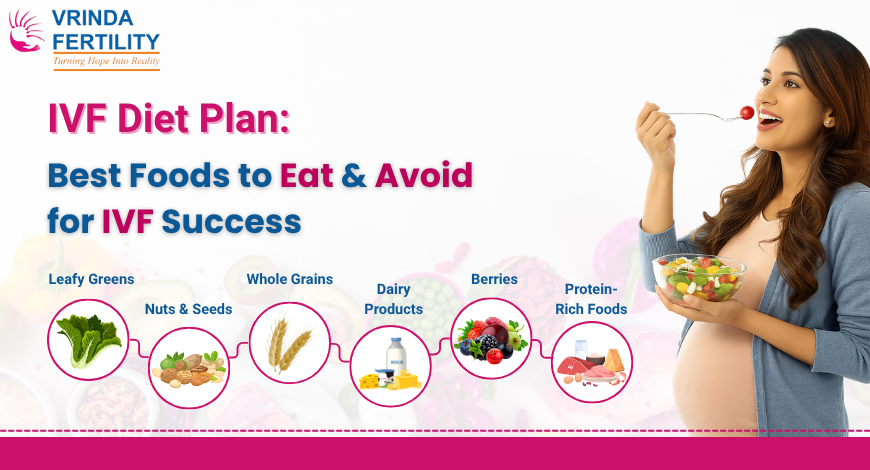Embarking on your fertility journey with Vrinda Fertility is an important step towards parenthood. Nutrition and lifestyle play a significant role in the outcome of your In Vitro Fertilization (IVF) treatment. By maximizing your diet and wellness, you can optimize your body’s ability to conceive and achieve a healthy, successful pregnancy.
Why IVF Diet Matters
IVF is not only a medical process but also a holistic journey. At Vrinda Fertility, we understand that diet can:
- Enhance egg quality and embryo development
- Improve uterine lining for successful implantation
- Boost hormonal balance
- Provide physical and mental resilience during IVF cycles
Scientific research and clinical experience strongly support the importance of nutrition for reproductive health, especially for those undergoing IVF.
Essential Principles of Vrinda Fertility IVF Nutrition
Balanced Nutrition
Aim for a balanced diet rich in:
- Vitamins & Minerals: Vital for reproductive health and hormonal stability
- Proteins: Essential for egg and embryo quality
- Good Fats: Omega-3s and monounsaturated fats support hormonal function
- Complex Carbohydrates: Release sustained energy and help regulate blood sugar
Hydration
Hydration is key for follicular development, optimal egg quality, and building a receptive uterine lining. Drink plenty of pure water throughout the day.
Antioxidants
Antioxidant-rich foods protect eggs, sperm, and reproductive tissues from oxidative stress.
Foods to Eat During IVF Treatment
Best Foods Before Embryo Transfer
- Berries (blueberries, strawberries, raspberries): Loaded with antioxidants
- Leafy greens (spinach, kale, lettuce): Rich in folate and iron
- Brightly colored vegetables: Carrots, peppers, tomatoes enhance cell protection
- Whole grains (quinoa, oats, brown rice): Promote steady blood sugar levels
- Lean proteins (chicken, fish, lentils): Aid in tissue repair and hormone synthesis
- Healthy fats (avocado, nuts, seeds): Support cell membranes and reproductive hormones
Foods to Support Implantation
- Omega-3 rich foods: Salmon, chia seeds, walnuts help build a thick, healthy uterine lining
- Dairy (low-fat milk, yogurt): Provides calcium for egg development
- Iron-rich foods: Lean meats, lentils, beans combat anemia and support ovulation
- Coconut water and beetroot juice: Promote blood flow to the uterus
Snacks for Fertility
- Carrot and cucumber sticks with hummus
- Handful of almonds
- Fruit like pomegranate or oranges
- Greek yogurt with flaxseeds or honey
Sample Vrinda IVF Diet Plan
Below is a suggested daily plan. Adapt to your preferences and consult your Vrinda Fertility nutritionist for a personalized plan.
| Meal | Example Foods | Benefits |
| Breakfast | Oatmeal + berries + flaxseeds | Antioxidants & fiber |
| Greek yogurt + nuts + honey | Protein & healthy fats | |
| Lunch | Grilled chicken salad + leafy greens + avocado | Essential nutrients & good fats |
| Quinoa + vegetable stir-fry | Protein & complex carbs | |
| Snacks | Carrot/cucumber sticks + hummus | Vitamins, minerals, protein |
| Handful of almonds | Vitamin E & healthy fats | |
| Dinner | Baked salmon + broccoli + brown rice | Omega-3s, fiber, folate |
| Lentil soup + whole grain bread | Iron, fiber, plant protein | |
| Beverages | Coconut water, beetroot juice, plain filtered water | Hydration, improved circulation |
Foods and Drinks to Avoid During IVF
Certain foods and beverages can harm fertility or IVF outcomes:
- Excess caffeine: Limit tea and coffee intake
- Fruits – You also must be avoid Pineapple & papaya during the pregnancy
- Alcohol: Avoid entirely; it reduces IVF success rates
- Processed foods: Remove junk food, artificial sweeteners, and excess sugar
- High-mercury fish: Tuna, swordfish (may affect embryo development)
- Unpasteurized dairy or raw meats: Carry infection risk
Vrinda Fertility recommends “clean eating” – focusing on whole, natural, and minimally processed foods.
IVF Success Tips Beyond Food
Stress Management
Emotional wellness is vital for your IVF journey. Engage in:
- Yoga and gentle exercise
- Meditation and mindfulness practices
- Counseling if needed for emotional resilience
Lifestyle Habits
- Avoid smoking: Tobacco reduces fertility for all genders
- Maintain a healthy BMI: Obesity or underweight can affect success
- Follow your prescribed IVF medication protocol strictly
Conclusion: Your Fertility Journey with Vrinda Fertility
At Vrinda Fertility, your nutritional plan is as important as your medical protocol. A well-structured, individualized IVF diet creates the conditions for successful conception and a healthy pregnancy. By focusing on nutrient-rich foods, hydration, mindfulness, and wise lifestyle choices, you give yourself the best chance at success.
For a truly personalized IVF meal plan and ongoing support, book a consultation with a certified Vrinda Fertility dietitian. Your journey to parenthood deserves compassionate expertise and the very best care.
Vrinda Fertility – Leading the way in IVF success and holistic fertility care | www.vrindafertility.com
Disclaimer: This guide is for educational purposes and does not substitute individual medical advice. Always consult your Vrinda Fertility specialist and a registered dietitian for tailored planning.
Frequently Asked Questions (FAQ)
Folate, vitamin D, vitamin E, iron, and Omega-3s top the list for egg/uterus health.
No single food guarantees IVF success, but berries, salmon, eggs, spinach, and nuts are highly recommended.
Supporting your body with gentle digestion, hydration, and low-inflammatory foods may increase implantation chances. Stick with whole foods and avoid extremes.
Yes: Trans fats, excess sugar, processed foods, and alcohol are associated with decreased fertility and should be strictly avoided during your IVF cycle.



